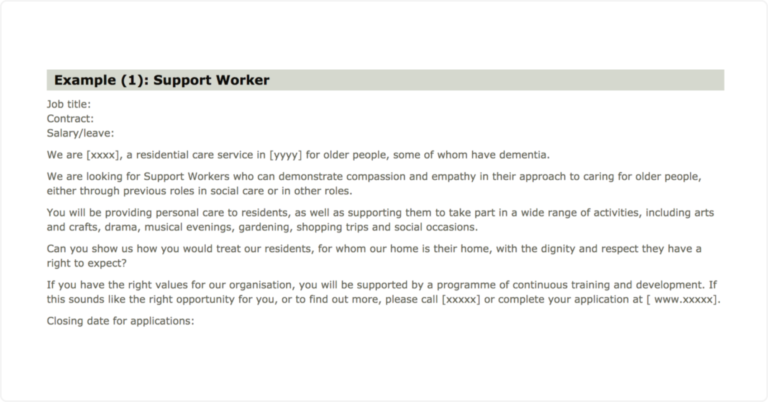As a recruiter, you already know the importance of culture fit when hiring new employees. When a new hire’s culture preference aligns with the reality of the company, they can feel happier in their new role and give their best work.
However, knowing how well someone will fit into your company’s culture is a challenge for organizations of all sizes. It’s not easy to assess how well an individual will fit into the day-to-day workings of a business. A value-based recruitment strategy is one way to put organizational fit at the forefront of your hiring process.
Listen to the values-based recruitment guide on the Recruitment On The Go podcast!
What’s in?
What is values-based recruitment?
Values-based recruitment prioritizes specific values, beliefs, and aspirations when attracting, hiring, and promoting individuals. By focusing on specific core ideas, companies are able to build a team comprised of the “right” people for the job.
Values are typically the guiding principles that are most important to the organization but also translate to the individual employee. These might be beliefs such as compassion, creativity, honesty, or reliability.
While this kind of recruitment is typically found in care, support, and education-oriented businesses, organizations in other industries are starting to adopt its principles because of the multiple benefits it brings.

98%
of employees wouldn’t work somewhere that does not fit their values.
Source: City of London Economic Research
Values based recruitment is beneficial not only for employers. Employees will get a clear idea about how compatible the company values are with their own throughout the recruitment process.
Advantages of values based recruitment
Prioritizing certain values throughout the recruitment process means you’re more likely to hire a candidate who truly fits your brand’s culture. By continuing to focus on those values throughout your daily office life, everyone on your team is working with the same principles and aspirations in mind.
But prioritizing values throughout the recruitment process does more than just ensuring everyone is on the same page. Here are a few advantages of a values based recruitment strategy:
1. Positive work environment
Fitting into a company culture can help employees feel more comfortable at work. However, sharing values and aspirations with team members can also facilitate stronger relationships between coworkers.
A values based recruitment strategy can create a positive work environment for new and existing hires. When employees are happy with their work environment, they’ll be more likely to stick around––meaning higher retention and improved employee satisfaction.
2. Improved staff morale
When employees are happy in their work environment and share common goals with other employees within the company, they will feel a deeper team spirit and more connected to their work.
With improved staff morale, employees will feel more valued and there will be less absenteeism within the company. Employees will show up on time and ready to tackle the challenges of the day.

95%
of executives believe that a poor hiring decision impacts the morale of the team.
Source: Robert Half
A new hire impacts the whole team. Recruiters and hiring managers need to make sure that they are hiring the right person.
3. Increased employee engagement
By incorporating values deeply into the work a company does, employees will become more engaged with their roles. They will feel more excited about their work and will want to ensure everything is done correctly the first time around.
More engaged employees are more likely to stay with a company for many years. They also provide better service to customers and clients, meaning a values based recruitment strategy can also foster stronger client relationships.
Like what you see?
Don’t miss out. Subscribe to our quarterly digest to get the latest TA and TM resources delivered right to your inbox.
4. Increased productivity
A positive work environment, improved staff morale, and increased employee engagement all mean increased productivity companywide, both in the short term and long term. Company culture and positive business outlook are linked.
Because employees are deeply connected to the work they’re doing, they will put more effort into working efficiently and creating meaningful outcomes. They’ll also be more invested in their roles, meaning they’ll put in extra effort to see their productivity grow––ultimately benefiting the company bottom line.

94%
of employees are 2-4x more likely to produce more for the organization if they love their workplace.
Source: Association for Talent Development
Working at a place where employees feel good and that matches their values has a positive influence on their productivity.
5. Reduced employee turnover
Happy employees mean less turnover for your company. If employees feel valued in their job, are engaged with their work, and they’re confident in the work that they’re doing, they’ll want to stick around longer.
Reduced employee turnover means each employee is a true investment in your company. You can lower costs while keeping productivity high and employees can grow their careers with your organization.
The state of diversity recruiting in 2020
Methods for successful values-based recruitment
Implementing a values based recruitment plan isn’t as easy as just saying certain beliefs are important to your company. Instead, you need to be strategic about how you showcase and measure values throughout the recruitment and hiring process.
Values should be present at every stage of the recruitment and hiring process. This ensures you’re connecting with the right people every step of the way. Here are a few steps you can follow to create a successful values-based recruitment plan:
1. Values mapping
Your first step in building a values based recruitment plan is to map out what beliefs and standards are important to your business.
For some organizations, this will be rather easy––especially if you already have your company values established. However, you want to think about how those values translate into everyday behaviors and actions on the job.
Think about the different values that go into your organization, including individual values, societal values, brand values, and organizational values. Be sure to address the company as a whole, as well as the employees within it.
Make a list of your most important values and characteristics. Imagine what values you’d like your organization to be associated with, such as commitment or open-mindedness, then write down a few ways these characteristics might translate into an employee’s day-to-day activities.
Build upon your list until you’re confident in the values you’ve established. This will act as the foundation for your values based recruitment strategy.

76%
of people who love their workplace report that their organization lives the values and ethics it espouses.
Source: Association for Talent Development
How an organization lives the values it wants to represent largely impacts how people perceive it.
2. Job adverts
When recruiting based on values, you want to be sure that those values are appearing in job adverts and postings, as well as on your career page. Infusing the values you’ve just identified in each and every job posting can ensure you’re attracting the right audience from the very beginning.
However, just listing the values or beliefs that are important to your brand isn’t really enough.
You want it to be clear that your values are more than just something that sounds nice. It should be clear how those values will translate into the job itself.
For example, if you establish respect and positivity as two of your core values, these should appear in all of your job adverts––regardless of job title or department.
While how those values would appear in the job roles might look different, applying the same values across job adverts can ensure you’re truly building a work environment centered around what is most important to you.
You also want to be sure your job adverts are inclusive for all groups of people. By ensuring you’re reaching all qualified candidates, you can attract individuals who are compatible with your company values, ultimately hiring higher quality employees.
Care service providers often employ values based recruitment practices and they translate their values into job ads in a comprehensible and convincing way.
3. Pre-employment assessments
Pre-employment assessments are tools or methods of evaluating job candidates. They can include hard skill tests, work sample tests, interviews, cultural, behavioral, or cognitive tests, and personality tests. In other words, pre-employment assessments are any measures you take to get to know your candidates a bit better, usually at the beginning of the recruitment process.
If you practice values-based recruitment, you want to use pre-employment assessments that help you identify the values most important to your candidates.
Here are some options:
- Cognitive ability testing. Cognitive ability tests, including puzzles or brain games, assesses the levels at which a candidate learns. This includes solving problems and understanding instructions. Cognitive ability tests are particularly useful for measuring values related to problem-solving or reasoning.
- Personality questionnaires. Personality questionnaires allow applicants to measure how strongly they disagree or agree with certain statements. This is great for evaluating six major dimensions of personality, including honesty-humility, emotionality, extraversion, agreeableness, conscientiousness, and openness to experience.
- Situational judgement tests. Situational judgement tests use text, videos, images, and questions to create lifelike scenarios where applicants can respond according to how they would react on the job. This provides insight into how a candidate might perform when on the job and also shows the candidates the realities of the job they are applying for.
Each of these pre-employment assessments can help you identify values that are important to your candidates so you are then able to identify individuals that fit the beliefs and aspirations important to your company.
However, at this stage, don’t look at assessments as purely black and white. A candidate who believes your company values more than another doesn’t necessarily mean they’re the best fit for the job. Instead, have a threshold for each assessment that says if a candidate is qualified or not.
Move all qualified candidates to the next round of the recruitment and hiring process––not just those who perform the best.
Note: You can see the entire library of Harver pre-employment assessments for volume hiring below.
4. Values-based interview techniques
Like pre-employment assessments, values-based interview techniques help you get to know your candidates better before you make a hiring decision. Roleplay, interview questions based on values, and follow-up questions can all help you identify candidates who fit your culture.
Here’s a breakdown of the values based interview techniques you should be using:
- Roleplay. Roleplaying different scenarios can help you see how candidates perform in potential real-life situations, as well as the values that drive those actions. For example, if a candidate would turn to their team to solve a problem, this could show they’re collaborative.
- Values-based interview questions. Interview questions rooted in your company values can also help you identify what is important to your candidates. For example, if social responsibility is a major value for your company, you can ask candidates for policy suggestions for creating a more environmentally-friendly brand.
Dig into both of these techniques with some follow-up questions. Strong follow-up questions that can help you pull more from the candidate include:
- What did you learn from this experience?
- Would you have done anything differently and if so, what?
- What did you learn about problem-solving from this experience?
- What were the consequences of this decision?
- What was the impact of this decision?
Asking candidates for the reasoning behind their responses can allow you to see their thought processes, as well as whether or not their unique values align with your company’s.
5. Assessment centers
An assessment center provides an additional look at a candidate’s values through group exercises, roleplay scenarios, and other opportunities that show various aspects of their abilities.
Incorporating an assessment center into your hiring or recruitment process can provide a more realistic look at your candidate, helping you determine whether or not their values match your own.
Assessment center programs or techniques can be much different than standard interviews or digital assessments, so just any recruitment or HR professional may not have the skills to translate their observations into meaningful insights. That’s why employees or professionals assessing candidates need to be well trained in observing and evaluating behavior and interactions.

9 in 10
organisations using assessment centers believe they are very effective.
Source: Employment Review
Although assessment centers are usually expensive to administer, they can be very effective in selecting candidates based on their values.
Over to you
Values-based recruitment is a specific approach to hiring that can be extremely beneficial. However, it also requires specific actions and steps during different phases of the recruitment process.
Creating a successful values-based recruitment plan depends on how well you know your organization, as well as the values that drive company-wide decisions and behaviors. By having a firm grasp of who your company is and what you value, you can identify those values in recruiting candidates.
Ready to transform your hiring process?









